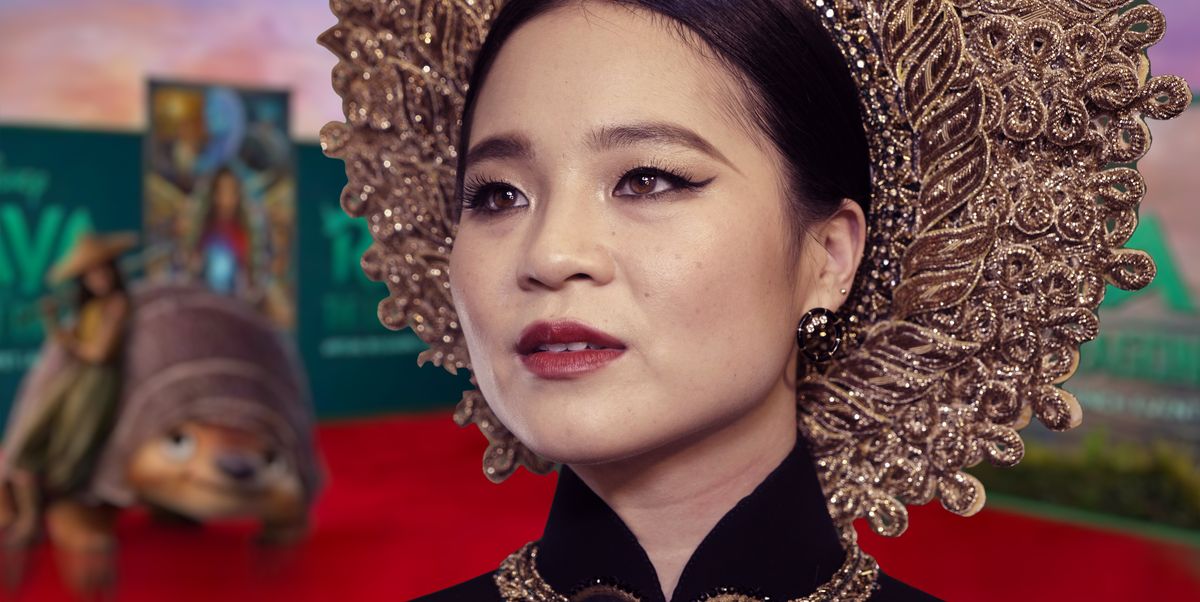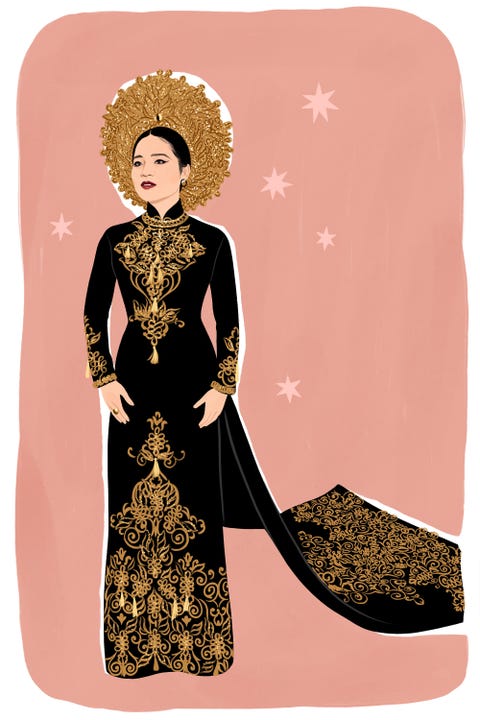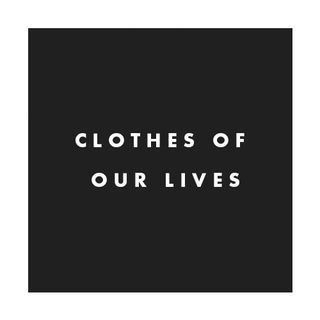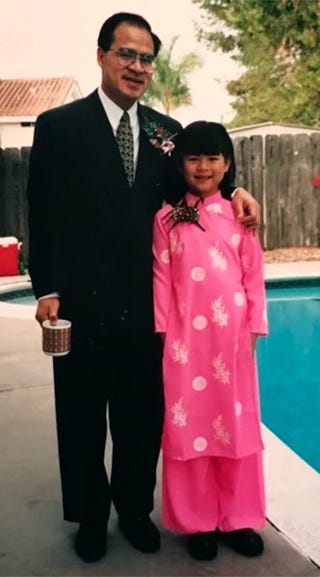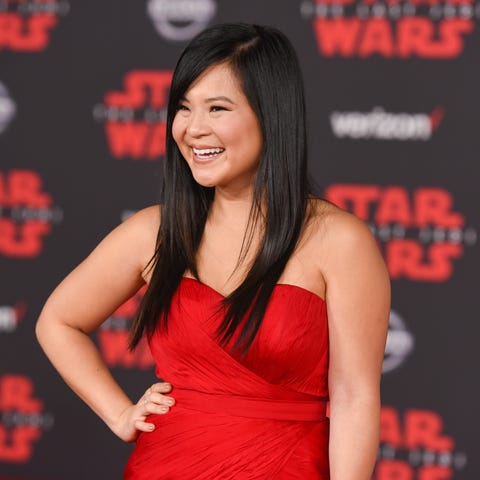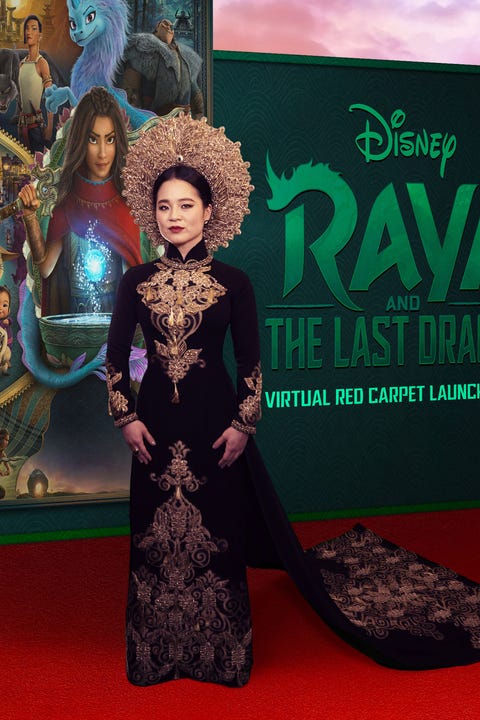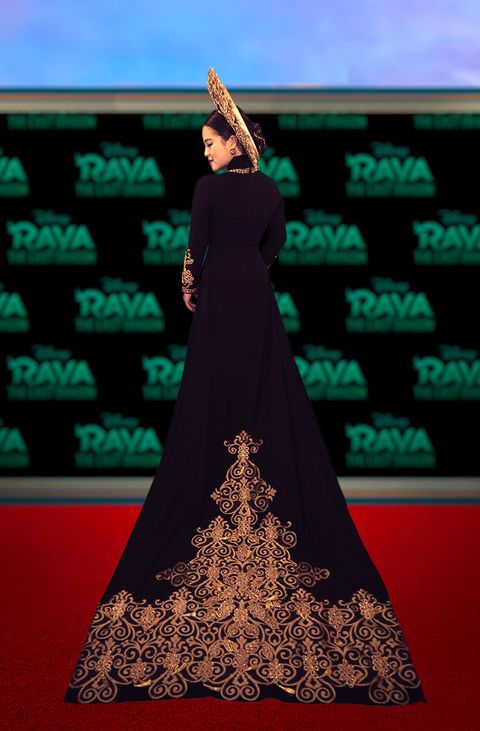When Kelly Marie Tran took on the role of Rose Tico in Star Wars in 2017, she became the first woman of color to play a lead in the series. What followed was an onslaught of racist and sexist comments from online trolls, leading her to delete her Instagram and eventually respond in a powerful personal essay. Just a few years later, she returned in another standout role, this time as the first-ever Southeast Asian Disney princess in Raya and the Last Dragon. To celebrate, Tran attended the film’s virtual premiere in a traditional Vietnamese dress and headdress, designed by Thai Nguyen.
ELLE’s series Clothes of Our Lives decodes the sartorial choices made by powerful women, exploring how fashion can be used as a tool for communication. We sat down with Tran to hear about what you wear when you’re making Hollywood history.
When I first started out in this industry, I had no idea how anything worked. Before I was in Star Wars, I was an office assistant. My dad works at Burger King, and my mom works in funerals. I didn’t know that actors had stylists. I didn’t know people sat in hair and makeup for hours before a premiere. It was all overstimulating, and it all happened so quickly, that at first I didn’t know I could make thoughtful decisions with what I wore. But now, I feel like a different person. I’ve recognized how I can use my power and my privilege to highlight voices that have historically been unheard.
I knew coming into this process that Raya and the Last Dragon was a movie I wish I had growing up. It meant so much to me, especially because it’s inspired by the cultures in Southeast Asia, where my family is from. Honoring this part of the world is something I rarely get to do in my work. I wanted to reflect that in a lot of my fashion choices for the press tour, so for the film’s virtual premiere, I texted Thai Nguyen, who designed my first premiere dress for The Last Jedi. (He also designed for Paris by Night, this big Vietnamese performance show my parents are obsessed with.) I asked him, “What do you think about me wearing an áo dài?” The áo dài is a traditional Vietnamese dress. My mom wore áo dài to school every day, though there are different versions, including more decorative áo dài for celebratory events. After I did The Last Jedi, I took my whole family back to Vietnam for the first time, and my sisters and I wore áo dài and took a picture outside of the street where my dad grew up homeless.
Thai was really excited about the idea and sent me some initial designs. But I stepped back and told him, “Thai, we get one chance. I want to feel like a full Vietnamese queen.” And he completely rose to the challenge. I knew I wanted our version to feel royal. I knew I wanted black and gold, as gold is a really important color in Asian culture. There’s also a phoenix motif, which was poetic because my Vietnamese name Loan translates to a sort of mythical, magical bird. Overall, it’s one of the most stunning things I’ve ever worn.
This content is imported from Instagram. You may be able to find the same content in another format, or you may be able to find more information, at their web site.
When I put it on with full hair and makeup the day of the premiere, I really felt like it was a Disney princess moment. Growing up, I was very much in a world where I wanted to hide the things that made me different. To be in a place where I was celebrating those very same things felt so healing and full-circle.
This content is imported from YouTube. You may be able to find the same content in another format, or you may be able to find more information, at their web site.
During the premiere, I was surprised with a video of all these other Disney princesses welcoming me into the family. I’m a girl who, five years ago, couldn’t pay off my student loans or make my rent. I was driving my half-broken Honda Civic around L.A. auditioning while working a full-time job. To then be wearing a dress from the country where my family’s from—and to have the voices that essentially sculpted my childhood welcome me into a family I never thought I’d be part of—was one of those magical, miraculous moments that can only be compared to Disney movies. It was that sense of impossible things becoming possible.
I remember leaving the premiere and thinking, this is an example of the world I want to live in. I don’t want that experience to only be for me. I want everyone to know what it feels like to be welcomed, just as they are, into a world where they don’t think they belong. For me, that moment was life-changing.
This experience has taught me so much about the ways in which I can use my voice and be really thoughtful about decisions I’m making. I recognize now I have a part to play in this story. Before I felt that I had to be so grateful because someone gave me a chance, almost like it was a fluke. Now I’m in this position where I’m still grateful, but also I know I deserve to be here. My voice is one that deserves to be heard. That’s not something I could have said about myself a few years ago. I’ve done work to recognize the ways in which I had internalized a lot of racism. I’m just a different person. I know who my friends are. I have people around me. I was so isolated before in this industry, and now I am not.
At this point, my experience in my career hasn’t only been mine. That day, wearing the áo dài, I wanted to symbolize that no matter where you are and no matter how dark it gets, impossible things are possible. It will get better. Celebrating who you are is a really healing experience, especially if those were things people attacked you for before. I just wanted people to believe in magic again, because I had to teach myself how to believe in it again too.
This interview has been edited and condensed for clarity.
This content is created and maintained by a third party, and imported onto this page to help users provide their email addresses. You may be able to find more information about this and similar content at piano.io
